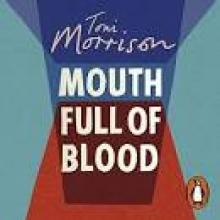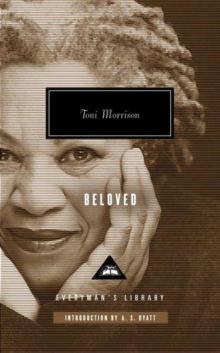- Home
- Toni Morrison
Paradise Page 7
Paradise Read online
Page 7
“I’m her father. I’ll arrange her mind.”
“Right,” said Steward.
“Settled then?” Deek asked.
“Like I say. Have to talk to her mother.”
“Of course.”
“She’s the key. My wife’s the key.”
Deek smiled outright for the first time that evening. “Women always the key, God bless ’em.”
Reverend Misner sighed as though breathable air were available again. “God’s love is in this house,” he said. “I feel it every time I come here. Every time.” He looked toward the ceiling while Jefferson Fleetwood stared at him with stricken eyes. “We treasure His strength but we mustn’t ignore His love. That’s what keeps us strong. Gentlemen. Brothers. Let us pray.”
They bowed their heads and listened obediently to Misner’s beautifully put words and the tippy-tap steps of women who were nowhere in sight.
The next morning Reverend Misner was surprised by how well he had slept. The meeting with the Morgans and Fleetwoods the previous night had made him uneasy. There was a grizzly bear in Fleetwood’s living room—quiet, invisible, but making deft movement impossible. Upstairs he’d made the women laugh—well, Mable anyway. Sweetie smiled but clearly didn’t enjoy his banter. Her eye was ever on her children. A slide. A lean. A suck of air—she bent over a crib and made quick, practiced adjustments. But her expression was mildly patronizing as if to say what could there be to amuse her and why would he try? She acquiesced when he asked her to join him in prayer. Bowed her head, closed her eyes, but when she faced him with a quiet “Amen,” he felt as though his relationship with the God he spoke to was vague or too new, while hers was superior, ancient and completely sealed.
He had better luck with Mable Fleetwood, who was delighted enough with his visit to prolong their conversation unnecessarily. Downstairs the men he had assembled, after learning what had happened at the Oven, waited—as did the grizzly.
Misner fought his pillow for a moment and convinced himself that the ending was satisfactory. Tempers banked, a resolution surfaced, peace declared. At least he hoped so. The Morgans always seemed to be having a second conversation—an unheard dialogue right next to the one they spoke aloud. They performed as one man, but something in Deek’s manner made Misner wonder if he wasn’t covering for his brother—propping him the way you would a slow-learning child. Arnold’s air of affront was coy: a formula everyone expected but knew had no weight. Jefferson’s skin was thin as gauze. But it was K.D. who irritated Misner most. Too quick to please. An oily apology. A devious smile. Misner despised males who hit women—and a fifteen-year-old? What did K.D. think he was doing? His relation to Deek and Steward protected him, of course, but it was hard to like a man who relied on that. Servile to his uncles; brutal with females. Then, later that evening, as Misner warmed up the fried steak and potatoes Anna Flood had brought him for his supper, he had looked out of his window and seen K.D. speeding down Central in Steward’s Impala. Smiling—he’d bet on it—his devious smile.
Such nagging thoughts he believed would keep him awake most of the night, but in the morning he woke as if from the sweetest of sleeps. Anna’s food, he supposed. Still, he wondered, what had K.D. been zooming to on the road out of town?
A man and a woman fucking forever. When the light changes every four hours they do something new. At the desert’s edge they fuck to the sky tide of Arizona. Nothing can stop them. Nothing wants to. Moonlight arches his back; sunlight warms her tongue. There is no way to miss or mistake them if you know where they are: right outside Tucson on I-3, in a town called Wish. Pass through it; take the first left. Where the road ends and the serious desert begins, keep going. The tarantulas are poisonous but it is necessary to go on foot because no tires can manage the terrain. One hour, tops, you’ll see loving to beat the sky. Sometimes tender. Other times rough. But they never stop. Not for dust storms or heat hovering at 108 degrees. And if you are patient and catch them in one of the desert’s random rainfalls you will see the color of their bodies deepen. But they keep on doing it in the rare pure rain—the black couple of Wish, Arizona.
Over and over Mikey told Gigi how they looked and how to find them outside his hometown. They would have been, could have been, a tourist attraction, he said, except they embarrassed local people. A committee of concerned Methodists, organized to blow them up or disguise them with cement, got started, but it died after a few preliminary investigations. The committee members said their objections were not antisex at all but antiperversion, since it was believed by some, who had looked very carefully, that the couple was two women making love in the dirt. Others, after an equally careful examination (close up and with binoculars), said no, they were two males—bold as Gomorrah.
Mikey, however, had touched the body parts and knew for a fact one was a woman, the other a man. “So what?” he said. “They weren’t doing it on a highway, after all. You had to go way out of the way to find them.” Mikey said the Methodists wanted to get rid of them but they wanted them to be there too. That even a bunch of repressed rednecks, too scared to have wet dreams, knew they needed the couple. Even if they never went near them, he said, they needed to know they were out there. At sunrise, he said, they turned copper and you knew they’d been at it all night. At noon they were silvery gray. Then afternoon blue, then evening black. Moving, moving, all the time moving.
Gigi loved to hear him say that part: “Moving, moving, all the time moving.”
When they got split up, Mikey got ninety days. Gigi was released from the emergency room with an Ace bandage on her wrist. Everything happened so fast they had no time to plan where to meet. The court-appointed lawyer came out saying no bail, no probation. His client had to do the whole three months. After calculating the sentence, minus the three weeks spent in jail, Gigi sent Mikey a message through the CA lawyer. The message was “Wish April fifteenth.”
“What?” asked the lawyer.
“Just say it. ‘Wish April fifteenth.’”
What did Mikey say to her message?
“‘Right on,’” he said. “‘Right on.’”
There was no Mikey, there was no Wish, there was no I-3 and nobody was fucking in the desert. Everybody she spoke to in Tucson thought she was crazy.
“Maybe the town I’m looking for is too small for a map,” she offered.
“Then ask the troopers. No town so small they don’t know it.”
“The rock formation is off the road. Looks like a couple making love.”
“Well, I seen some lizards do it in the desert, miss.”
“Cactus, mebbe?”
“Now there’s a possibility.”
They laughed themselves weak.
After running her finger down columns in the telephone directory and finding no one in the area with Mikey’s last name, Rood, Gigi gave him up. Reluctantly. The eternal desert coupling, however, she held on to for dear and precious life. Underneath gripping dreams of social justice, of an honest people’s guard—more powerful than her memory of the boy spitting blood into his hands—the desert lovers broke her heart. Mikey did not invent them. He may have put them in the wrong place, but he had only summoned to the surface what she had known all her life existed…somewhere. Maybe Mexico, which is where she headed.
The dope was heavy, the men always ready, but ten days later she woke up crying. She called Alcorn, Mississippi, collect.
“Bring your butt home, girl. World change enough to suit you? Everybody dead anyway. King, another one of them Kennedys, Medgar Evers, a nigger name of X, Lord I can’t think who all since you left not to speak of right here remember L.J. used to work down at the route two mall somebody walked in there broad daylight with a pistol shaped like nothing nobody ever seen before…”
Gigi let her head fall back on the plaster wall near the telephone. Outside the bodega a clerk swung a broom at some children. Girls. Without underwear.
“I’m coming, Granddaddy. I’m heading home right now.”
&
nbsp; Most of the time she had both seats to herself. Space to spread out. Sleep. Read back issues of Ramparts rolled in her knapsack. When she boarded the Santa Fe, the train pulled out crowded with air force men in blue. Soon 4-H’ers crowded the cars. But when she transferred to the MKT, the cars were never full again.
The man with the earring didn’t come looking for her. She sought him out. Just to talk to somebody who wasn’t encased in polyester and who looked like he might smoke something other than Chesterfields.
He was short, almost a dwarf, but his clothes were East Coast hip. His Afro was neat, not ragged, and he wore seeds of gold around his neck, one matching stud in his ear.
They stood next to each other at the snack bar, which the attendant insisted on calling the dining car. She ordered a Coke without ice and a brownie. He was paying for a large cup of ice only.
“That ought to be free,” Gigi said to the man behind the counter. “He shouldn’t have to pay for the cup.”
“Excuse me, m’am. I just follow rules.”
“I ordered no ice. Did you deduct anything?”
“Course not.”
“Don’t trouble yourself,” the short man said.
“I ain’t troubled,” Gigi told him, and then, to the counterman: “Listen, you. Give him the ice you weren’t going to charge me for, okay?”
“Miss, do I have to call the conductor?”
“If you don’t, I will. This is train robbery, all right—trains robbing people.”
“It’s all right,” said the man. “Just a nickel.”
“It’s the principle,” said Gigi.
“A five-cent principle ain’t no principle at all. The man needs a nickel. Needs it real bad.” The short man smiled.
“I don’t need nothing,” said the attendant. “It’s the rules.”
“Have two,” said the man, and flicked a second nickel into the saucer.
Gigi glaring, the earring man smiling, they left the snack bar together. She sat down across the aisle from him to expand on the incident, while the man crunched ice.
“Gigi.” She held out her hand. “You?”
“Dice,” he said.
“Like chopping small?”
“Like pair of.”
He touched her with a cool, cool hand and they made up stories for each other for miles. Gigi even got comfortable enough to ask him had he ever seen or heard tell of a rock formation that looked like a man and a woman making out. He laughed and said no, but that he once heard about a place where there was a lake in the middle of a wheat field. And that near this lake two trees grew in each other’s arms. And if you squeezed in between them in just the right way, well, you would feel an ecstasy no human could invent or duplicate. “They say after that can’t nobody turn you down.”
“Nobody turns me down now.”
“Nobody? I mean no-o-body!”
“Where is this place?”
“Ruby. Ruby, Oklahoma. Way out in the middle of nowhere.”
“You been there?”
“Not yet. But I plan to check it out. Say they got the best rhubarb pie in the nation.”
“I hate rhubarb.”
“Hate it? Girl, you ain’t lived. You ain’t lived at all.”
“I’m going home. See my folks.”
“Where’s home for you?”
“Frisco. All my folks live in Frisco. I just talked to my grandfather. They’re waiting on me.”
Dice nodded but said nothing.
Gigi stuffed the brownie wrapper in her empty paper cup. I am not lost, she thought. Not lost at all. I can go see Granddaddy or go back to the Bay or…
The train slowed. Dice rose to collect his luggage from the overhead rack. He was so short he had to stand on tiptoe. Gigi helped him and he didn’t seem to mind.
“Well, I get off here. Nice talking with you.”
“You too.”
“Good luck. Watch out, now. Don’t get wet.”
If the boys standing in front of a kind of barbecue grill had said, No, this is Alcorn, Mississippi, she probably would have believed them. Same haircuts, same stares, same loose hick smiles. What her granddaddy called “country’s country.” Some girls were there too, arguing, it seemed, with one of them. In any case, they weren’t much help, but she enjoyed the waves of raw horniness slapping her back as she walked off down the street.
First dust, fine as flour, sifted into her eyes, her mouth. Then the wind wrecked her hair. Suddenly she was out of town. What the locals called Central Avenue just stopped, and Gigi was at Ruby’s edge at the same time she had reached its center. The wind, soundless, came from the ground rather than the sky. One minute her heels clicked, the next they were mute in swirling dirt. On either side of her, tall grass rolled like water.
She had stopped five minutes ago in a so-called drugstore, bought cigarettes and learned that the boys at the barbecue grill were telling the truth: there was no motel. And if there was any pie it wasn’t served at a restaurant because there wasn’t one of those either. Other than the picnic benches at the barbecue thing, there was no public place to sit down. All around her were closed doors and shut windows where parted curtains were swiftly replaced.
So much for Ruby, she thought. Mikey must have sent her that lying freak on the train. She just wanted to see. Not just the thing in the wheat field, but whether there was anything at all the world had to say for itself (in rock, tree or water) that wasn’t body bags or little boys spitting blood into their hands so as not to ruin their shoes. So. Alcorn. She might as well start over in Alcorn, Mississippi. Sooner or later one of those trucks parked by the Seed and Feed store would have to start up and she would hitch the hell out of there.
Holding on to her hair and squinting against the wind, Gigi considered walking back toward the feed store. Her backpack felt heavy in high heels and if she didn’t move, the wind might topple her. As suddenly as it had begun the wind quit; in its absence she heard an engine coming toward her.
“You headed out to the Convent?” A man in a wide-brimmed hat opened the door of his van.
Gigi tossed her backpack on the seat and climbed in. “Convent? You kidding? Anything but. Can you put me near a real bus stop or train station or something?”
“You in luck. Take you right to the track.”
“Great!” Gigi dug around in the pack between her knees. “Smells new.”
“Brand-new. You all my first trip.”
“You all?”
“Have to make a stop. Another passenger going to take a train ride too.” He smiled. “My name’s Roger. Roger Best.”
“Gigi.”
“But you free. The other one I charge,” he said, cutting his eyes away from the road. Pretending to examine the scenery through the passenger window, he looked at her navel first, then further down, then up.
Gigi pulled out a mirror and, as best she could, repaired the wind damage to her hair, thinking, Yeah. I’m free, all right.
And she was. Just as Roger Best said, there was no charge to the living, but the dead cost twenty-five dollars.
Every now and then the woman sitting on the porch steps lifted her aviator’s glasses to wipe her eyes. One braid from under her straw hat fell down her back. Roger leaned on his knee and spoke to her for what seemed to Gigi a long time, then they both went inside. When Roger came out, he was closing his wallet and frowning.
“Ain’t no help out here. You may’s well wait inside. Going to take me a while to get the body down.”
Gigi turned to look behind her but couldn’t see through the partition.
“Jesus! Shit! This here’s a hearse?”
“Sometimes. Sometimes it’s a ambulance. Today it’s a hearse.” He was all business now. No quick glances at her breasts. “Got to get it on board the MKT at eight-twenty p.m. And I got to be there not in time but on time.”
Gigi was quick but clumsy stepping out of the van, now hearse, but she made it around the house, up the wide wooden stairs and through the front doors in no
time at all. He had said “Convent,” so she thought sweet but stern women floating in sailboat hats above long black sleeves. But there was nobody, and the woman in the straw hat had disappeared. Gigi walked through a marble foyer into another one, twice the size. In the dimness she could see a hallway extending to the right and to the left. In front of her more wide stairs. Before she could decide which way to go, Roger was behind her carrying a metal something with wheels. He moved toward the stairs, mumbling, “Not a bit of help, not a bit.” Gigi turned right, rushing toward light coming from under a pair of swing doors. Inside was the longest table she had ever seen, in the biggest kitchen. She sat there, chewing her thumbnail, wondering just how bad could it be riding with a dead person? There was some herb in her pack. Not much but enough, she thought, to keep her from freaking. She reached out and pinched off a bit of crust from a pie sitting before her and noticed for the first time the place was loaded with food, mostly untouched. Several cakes, more pies, potato salad, a ham, a large dish of baked beans. There must be nuns, she thought. Or maybe all this was from the funeral. Suddenly, like a legitimate mourner, she was ravenous.
Gigi was gobbling, piling more food onto her plate even while she scooped from it, when the woman entered without her straw hat or her glasses and lay down on the stone-cold floor.
Her mouth was full of baked beans and chocolate cake so Gigi could not speak. Outside Roger’s horn blasted. Gigi put her spoon down but held on to the cake as she walked over to where the woman lay. Squatting down, she wiped her mouth and said, “Can I help you?” The woman’s eyes were closed but she shook her head no.
“Is it anybody else here I can call?”
She opened her eyes then, and Gigi saw nothing—just a faint circle where the edge of the iris used to be.
“Hey, girl. You coming?” Roger’s voice was puny and distant over the throb of his engine. “I got a train to meet. On time! I got to be on time!”
Gigi leaned down closer, gazing into eyes with nothing to recommend them.
“I said is anybody else here?”

 Paradise
Paradise Beloved
Beloved Home
Home Tar Baby
Tar Baby The Bluest Eye
The Bluest Eye Jazz
Jazz Love
Love Sula
Sula Mouth Full of Blood
Mouth Full of Blood Song of Solomon
Song of Solomon The Source of Self-Regard
The Source of Self-Regard A Mercy
A Mercy Beloved_a novel
Beloved_a novel